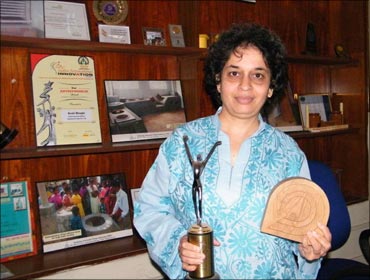
Svati Bhogle, managing director of Sustaintech India Pvt Ltd, is not a typical entrepreneur: she is more a scientist than an entrepreneur.
"It took me a long time to make myself accept that what I am doing is entrepreneurial. I was thinking I was being an innovative scientist," says Svati.
It is tough for a scientist to be an entrepreneur. Okay, you can call me a social entrepreneur. I want to be an entrepreneur who can make an impact on the lives of people," she adds.
No wonder she has been short-listed for the 2011 finals of Cartier Women Initiative awards for the Asia-Pacific region. Her achievement: through Sustaintech, she has been 'promoting the use of healthier, sustainable energy technologies by developing and selling energy-efficient cooking stoves to street-food vendors and commercial kitchens'.
. . .
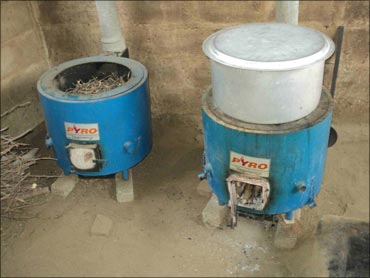
The journey of an MTech graduate in chemical engineering from IIT Bombay to an entrepreneur is accidental. As she came from a family of academics, she never dreamt of becoming an entrepreneur. After graduating from IIT-B, she developed a strong interest in technology for development.
When working for the Karnataka State Council for Science and Technology, she was initially involved in the research on the development of fuel-efficient, biomass-based stoves and dryers, for a variety of applications.
But when she found that the fruits of research are not ending up where they should be, "I decided to channel it to gain social impact. When you work with socially committed scientists, you ask yourself the question, what is science for? You ask yourself the question when the fruits of your research end up in some academic publications. As a scientist, you also need to know whether your product will succeed at the grassroots level."
"There is no point in designing products if they do not reach the people and are of no use to their lives. You also have to design for the society you live in, using the raw materials that are available to them. There are a lot of social, financial challenges to technological innovation. That, I felt not many scientists are following."
. . .
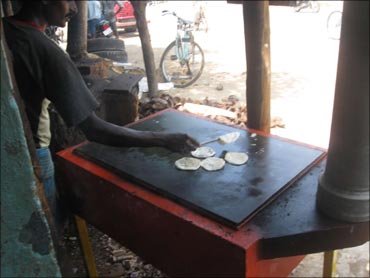
Even then, she was not thinking like an entrepreneur but as a scientist who wanted to take science to the people.
In 1993, a group of like-minded scientists including Dr Rajagopalan, working as a scientist at IISc, Bangalore, Svati Bhogle, joined hands and started TIDE (Technology Informatics Design Endeavour) as a not-for-profit society.
The idea behind TIDE was to promote sustainable development through technological interventions by identifying economically rewarding, environment-friendly technologies invented in India's research labs, and develop them into successful enterprises.
Svati formally joined TIDE in 1997 and soon took over as CEO and secretary of TIDE. "At TIDE, we believe in technology transfer from lab to the people. We want to create an ecosystem of rural entrepreneurs. We see to it that the technologies are replicable by them and that they receive the necessary legal, administrative and financial help."
. . .
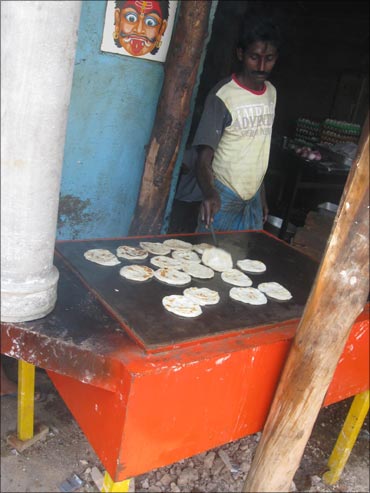
TIDE works on technologies related to biomass energy in non formal rural industries, sericulture, post-harvest processing, fish-drying, waste-to-energy conversion and rainwater harvesting.
As TIDE addresses energy issues and helps create rural entrepreneurs., the products promoted by TIDE are energy efficient stoves that save at least 25 per cent to 30 per cent fuel. These stoves are designed for use in the preparation of Ayurvedic medicines, rubber band making, areca boiling, textile processing, sericulture, frying chips, etc.
The rural grassroots entrepreneurs identified by TIDE make roughly 1,500 stoves/dryers/water heaters per year. The cost of a stove is around an average of Rs 7,000 and the profit margin is at 15 per cent.
It is estimated that more than 8,000 rural enterprises and 3,000 rural households directly benefit from the improved devices developed and promoted by TIDE and made and delivered by their entrepreneurs for the last 10 years.
. . .
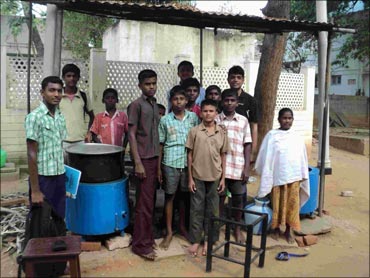
TIDE works extensively in Karnataka, Tamil Nadu and Kerala. In 2008, TIDE won the Ashden International Energy Champion Award from the United Kingdom for their work in sustainable energy.
In order to scale up rapidly and replicate, the five members of the board of TIDE decided to start a commercial venture. As TIDE, a not for profit venture cannot have the ownership of a commercial venture, Sustaintech, a for-profit entity was registered as a product development company with a capital of around Rs 2 lakh (Rs 200,000) in 2009.
As a Villgro-incubated company, it has been seeded with Rs 25 lakh (Rs 2.5 million) for its start up activities. The 44,000 pounds won from the Ashden award also went the design of stoves, patenting, brand name, certification, etc, at Sustaintech.
Svati Bhogle is the founder of Sustaintech with two more members from TIDE as promoters. "Sustaintech was started to take our ideas to a market. We decided against going for household stoves which was a subsidised market and we were not interested in subsidies. So, we identified cooking stoves for street vendors and small commercial kitchens like canteens, dhabas, etc. In India, millions of people with limited incomes eat outside, buying food from street vendors," she says.
. . .
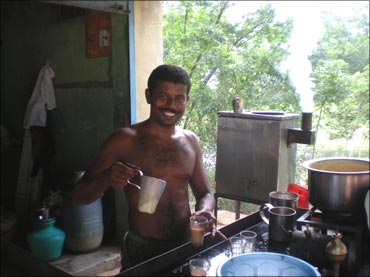
Svati says that street-side food-vendors burn huge amounts of firewood in open fires. "It costs them a lot of money and also has adverse effects on the climate and deforestation."
First, Sustaintech looked at the cooking needs of Tamil Nadu. Market surveys done by them found that 50 per cent of 94,300 potential vendors and small catering outlets in the state wanted to invest in a cleaner, more efficient stove.
As firewood is the cheapest fuel, they developed three wood-burning stoves under the brand name Pyro. Each is adapted to a particular type of cooking; one to make dosas on a flat plate, one to make tea by the roadside, and one for frying and multi-purpose cooking.
They tested all the three models in a few villages in Tamil Nadu and found that users were quite happy. "They do not change the user's cooking habits and they all have chimneys and temperature isolation. They are smokeless and prevent the cook from getting burned."
. . .
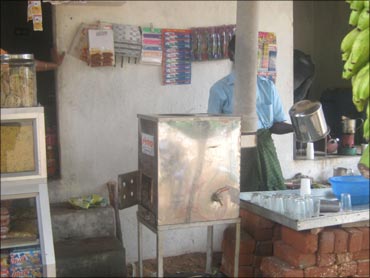
These insulated stoves reduce fuel consumption by 40 per cent, burning an average 3 kg of fuel an hour as opposed to 5 kg normally, and create a cleaner, healthier environment for the cook.
Stoves are today manufactured at three centres in Tamil Nadu; Erode, Trichy and Madurai. In the last 8 months after Sustaintech started manufacturing stoves, it has sold 250 stoves, and by the end of first year, they plan to sell 450 stoves priced between Rs 15,000 and Rs 17,000 (there are stoves in three different sizes). In the second year, they want to sell 6,000 stoves and 10,000 in the third. They want to expand all over south India.
Sustaintech also plans to strike loan deals with banks for the benefit of the rural entrepreneurs. They are looking at repayment options via the mobile phone so that these people need not go the bank to repay the loan.
"In renewable energy, the way to scale up is through financial innovations. We think that this is the way forward for small renewable energy projects. Projects of wind energy, etc are more commercial and mainstream."
. . .
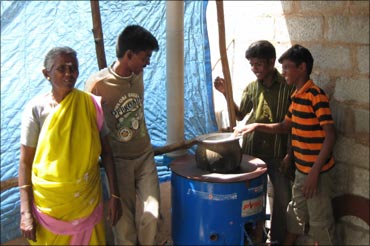
As a for-profit venture, not only is Sustaintech generating profits but also positive social and environmental impact. "We measure our impact by four key indicators: reduction of deforestation, reduction of carbon emission, money saved by the micro entrepreneur and the health Impact. As we reduce carbon emission, we are trying to get companies in invest in our company. When you have investors, the price of the stoves also will come down."
Some profits from Sustaintech will fund the initiatives led by TIDE, always with the goal that 'research ends up with the people, not just in research papers.'
How was life as an entrepreneur for a scientist? Svati Bhogel explains, "Very difficult. I am an entrepreneur who wants to make an impact on society. The question is 'what is the objective of the business'? It must be for social impact."
"Yes, I have to use business models, commercial networks but the goal is not rabid money-making. Of course, you have to make money to run the business. The bottomline is not profitability but profitability for social impact," she adds.